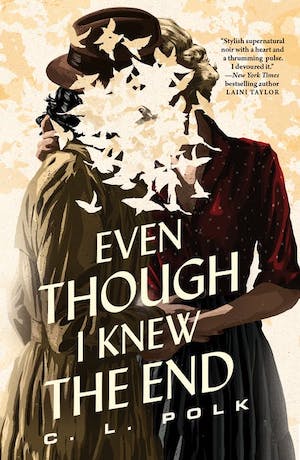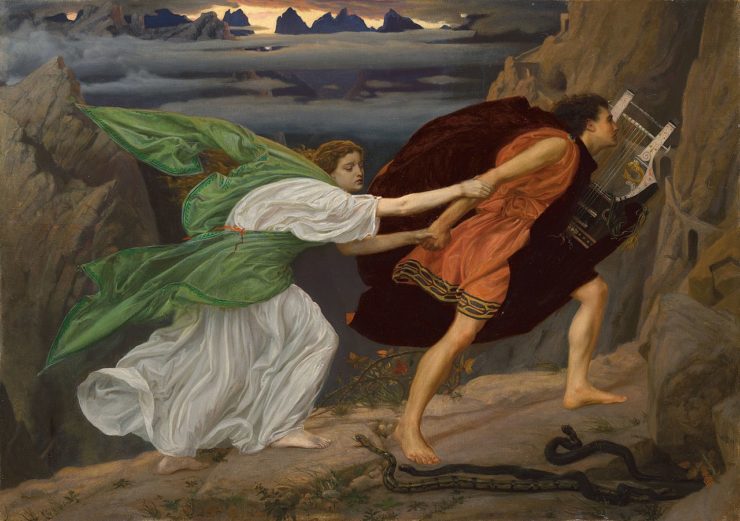“It isn’t finished yet,” sings a caught-off-guard Orpheus when Eurydice asks him to sing the song he’s working on.
Every night, Hadestown runs again. Orpheus repeats the phrase, and a new audience whisks away to the industrial reimagining of Hades in which the musical takes place.
Hadestown brings the tale of Orpheus and Eurydice into the modern era, punctuated throughout with folksy, melodic music by Anaïs Mitchell. In case you’re unfamiliar, the original myth sees Orpheus trek to the underworld to retrieve his lost love, Eurydice. When he arrives, Hades strikes a deal with the boy. Orpheus may walk out of the underworld, and Eurydice may follow him, but he cannot look back. The entire journey must be undertaken facing forward and looking ahead, without checking to see whether his love still remains behind him. If Orpheus looks back, Hades will claim Eurydice for good. Normally I’d let you guess how it ends, but the finale is important to my point. If you don’t want spoilers for Hadestown (or an ancient myth), here’s your warning.
Orpheus walks the long road back to the land of the living. By the time he nears the end, he has grown paranoid and uncertain. Just as he crosses the threshold back to his world, he turns to look for Eurydice, who stands just on the other side.
The audience gasped at that moment, and I joined them. I knew the myth. I expected the outcome, but the moment resonated just the same.
Ninety minutes prior, Hermes foreshadowed the moment in “Road To Hell,” the opening song: “It’s an old song / It’s an old song from way back when / and we’re gonna sing it again.” Then later: “It’s a sad song / but we sing it anyway.”
Hadestown asks and answers many questions during its runtime. By far, my favorite is: Why do we tell stories time and again?
Buy the Book


Even Though I Knew the End
Every time I hear a story—whether or not I’ve already heard it—it changes me. Sometimes it’s a simple change: I’m now a person who has heard this story one more time. Other times, it’s a more resonant growth: the story unlocked something in me; something clicked like it hadn’t before.
Hadestown sparked the latter change in me. I left the show prepared and eager to seek out retellings and reimaginings of myths, legends, and popular stories.
As a young reader, I loved Peter and the Starcatchers. I admired the complexity of the prequel series and how it bled into what most young readers know as the most familiar take on Peter Pan—namely, Disney’s animated version.
I grew older, and my tastes changed. I explored new genres and tropes. As my horizons continued to expand as an adult reader, I grew increasingly irritated with the constant influx of retellings. Do fairy tales and folklore, passed through generations, need reimagining to be relevant? I read Jennifer Saint’s Ariadne, a beautiful book by many measures, and closed the back cover wishing it had been something different.
Maybe I’m just not one for retellings, I thought. And then I saw Hadestown. I realized my sample size was far too small, and my assumptions far too premature.
“It isn’t finished yet,” Orpheus sings in one of the first numbers of the Tony Award-winning show. The musical tells a tale I’ve heard before—one that I, in my myopic view, thought was definitely finished.
By the show’s final moments, I had witnessed a creative reimagining of a myth I’d heard many times. Hades is reimagined as a stand-in for industrialism and capitalism; Persephone as a stand-in for the environment and the seasons. Orpheus and Eurydice exist within systems made to oppress them, and Orpheus fights back at great cost to himself and his beloved.
The story ends the same way it always has. Orpheus looks back. Eurydice returns to Hades. The company sings, telling us they’ll sing this sad song again.
Hadestown ends as it begins: the tale of Orpheus and Eurydice starts anew, ready to be told once more. It isn’t simply a retelling. It’s making a case for the necessity of retelling myths and stories that resonate down through the ages. It is equal parts self-contained story, one worthy of your time in its own right, and an argument for its form. Audience members whispered questions to one another during intermission, seeking clarification and details they may not have known without a passing familiarity with Greek mythology. I heard my neighbors explain the story to their loved ones as best they could, but it didn’t truly matter. In the end, when Orpheus looked back, everyone sat stock-still in unison.
Here was a group of people absorbing an ages-old tale, told uncountable times over the years. Here they were, gasping in awe at the tragic ending. And here I was, gasping with them, frozen in shock.
I knew the myth; I knew the ending. But it hit me just the same, and I exited the theater eager and determined to revisit the various retellings I’d overlooked in recent. (And if you have any suggestions or recommendations along those lines, please let me know in the comments below!)
“It isn’t finished yet.”
A myth’s work is never finished. Its purpose is to be retold and recontextualized. Morals and cultures may change, but Hadestown updates a classic legend with striking relevance.
Every time a story is told, it wields the power to change, and that potential does not diminish over time. The actors, musicians, and crew of Hadestown have performed the show thousands of times. I sat in the audience one time, for a single showing. When I left, I thought no story could ever be truly finished, so long as there are ears to hear it, and minds open to understanding it in a new light.
Cole Rush writes words. A lot of them. For the most part, you can find those words at The Quill To Live or on Twitter @ColeRush1. He voraciously reads epic fantasy and science-fiction, seeking out stories of gargantuan proportions and devouring them with a bookwormish fervor. His favorite books are: The Divine Cities Series by Robert Jackson Bennett, The Long Way To A Small, Angry Planet by Becky Chambers, and The House in the Cerulean Sea by TJ Klune.











I love the idea that every time we hear/read/see a story, it’s different from the last time. It’s the same story, but the context in which we’re viewing it has changed. We get something new out of it. It’s very tangible proof that we are not stagnant, but always changing. I find comfort in that.
As an extension of “reimagining,” I think i’d be fun if there was one random show in each month that has Orpheus not turning around, to completely shock/confuse the audience. This could work for any show as a way to keep your audience on edge, and add some extra music that only this special audience gets to hear. Maybe Hamilton wins the duel this time, or Mimi gets better and they pay their Rent on time, or (to flip it the other way) the von Trapps get caught by the Nazis, or Annie has to go back to her original parents. If the audience can’t be certain of the ending, they’re going to be way more engaged.
@2: that’s the advantage to these old stories; on the one hand, we know how they go, but on the other hand we can retell them to fit whatever we want our audience to see. Because they’re classics, we know what to expect and everyone knows them; because they’re myths, they can change to fit the needs of the storyteller.
P.S: the thought of Hamilton winning the duel made me laugh.
For me the operative line in “Road to Hell” is “someone’s got to tell the tale / whether or not it turns out well / maybe it will turn out this time”. This is what lures you into the idea that maybe the ending could be different from the one you know. That and, well, the fact that musicals and Disney adaptations rewrite tragic endings all the time.
@2: Maybe they could do it like the original theatrical release of the Clue movie. Three different endings cycled through at random, and the audience doesn’t know beforehand which one they’re going to get.
“Sometimes it’s a simple change: I’m now a person who has heard this story one more time. Other times, it’s a more resonant growth: the story unlocked something in me; something clicked like it hadn’t before.”
Just so. Thanks for sharing.
“As a young reader, I loved Peter and the Starcatchers.”
Cripes, I’m old.
I think one of the best things about the show is that at the end, once they’ve restarted the tale, it’s implied it will turn out this time since spring is here and eurydice already has the flower. I think that was their way of giving the audience hope